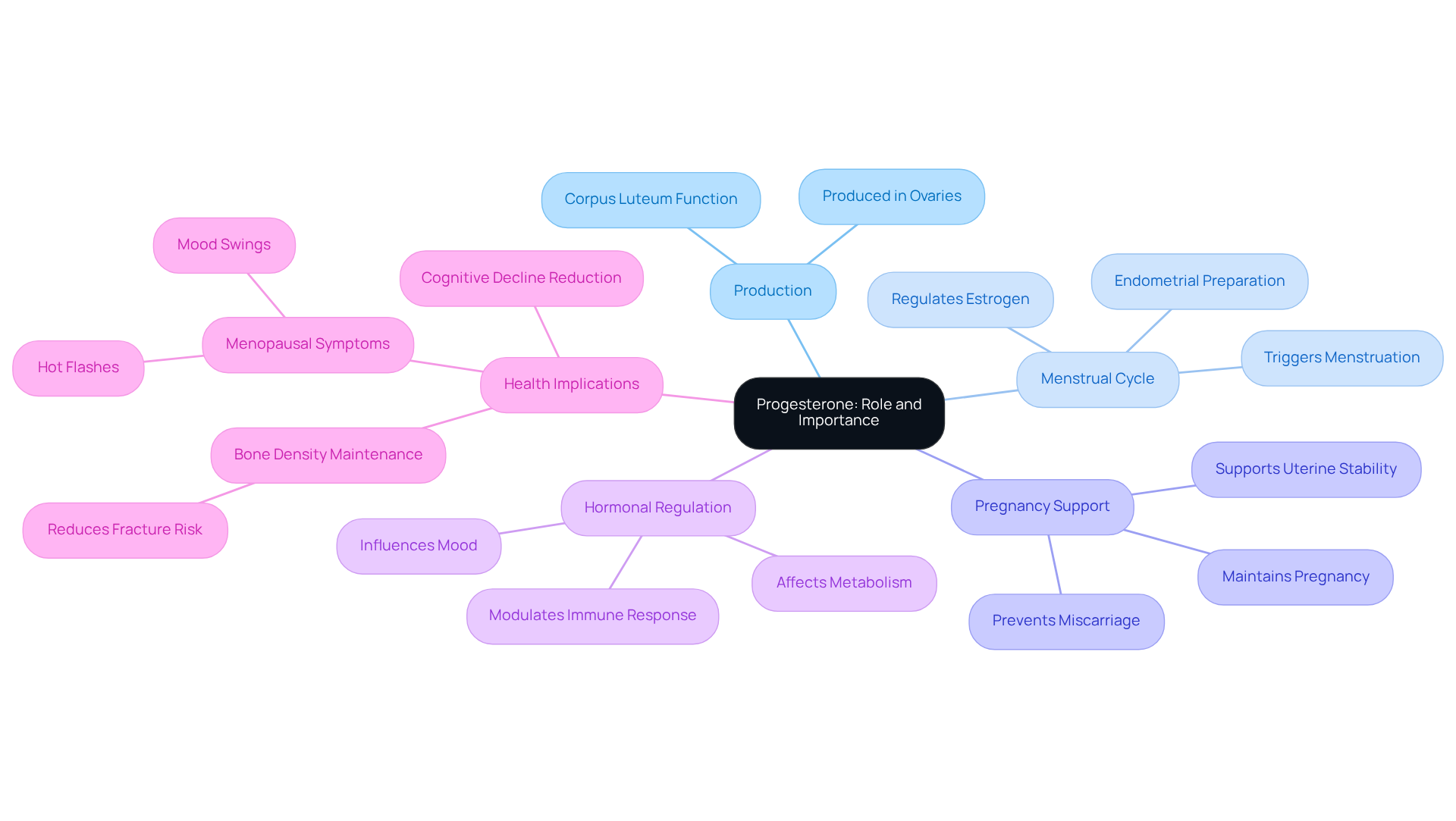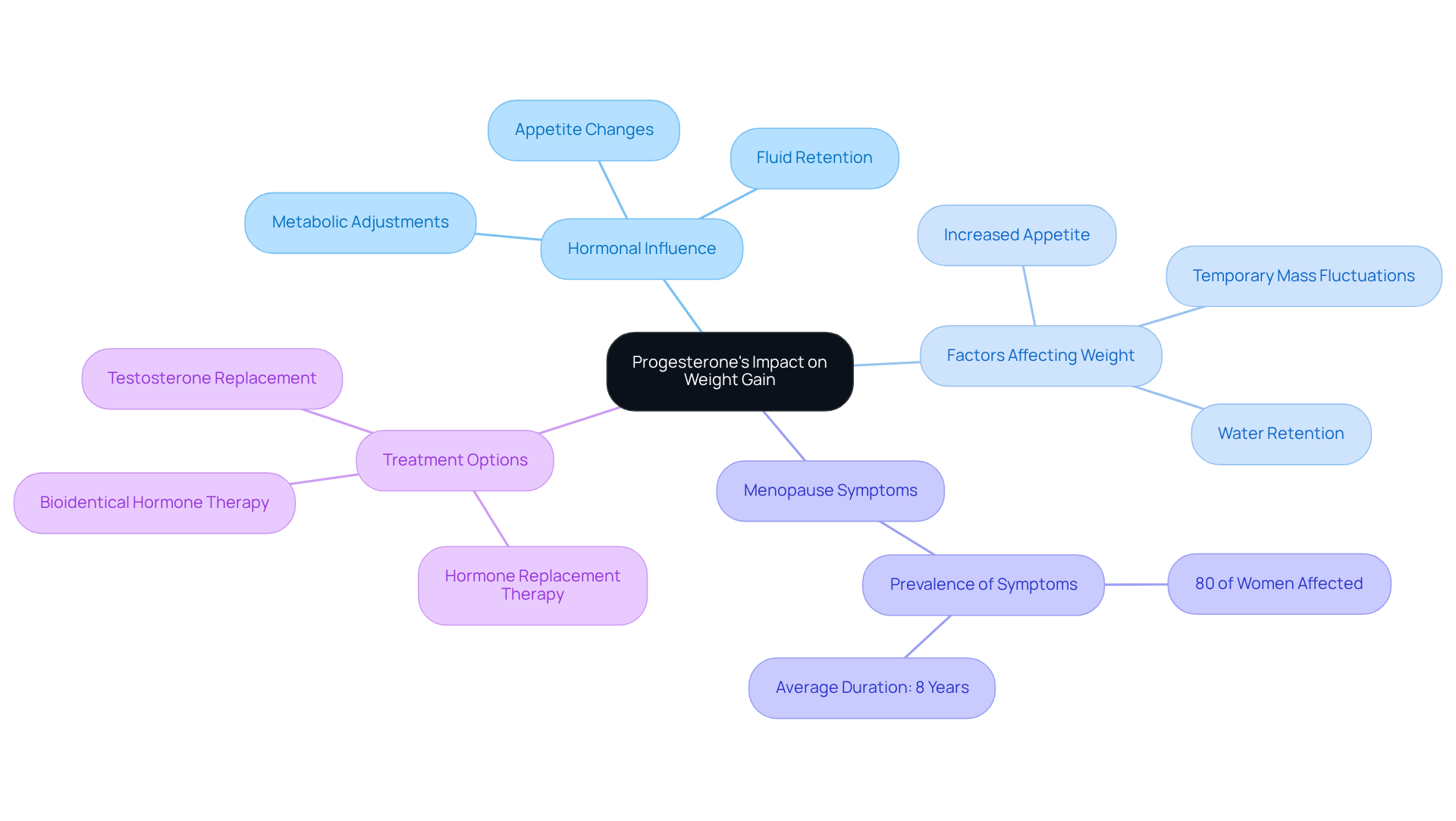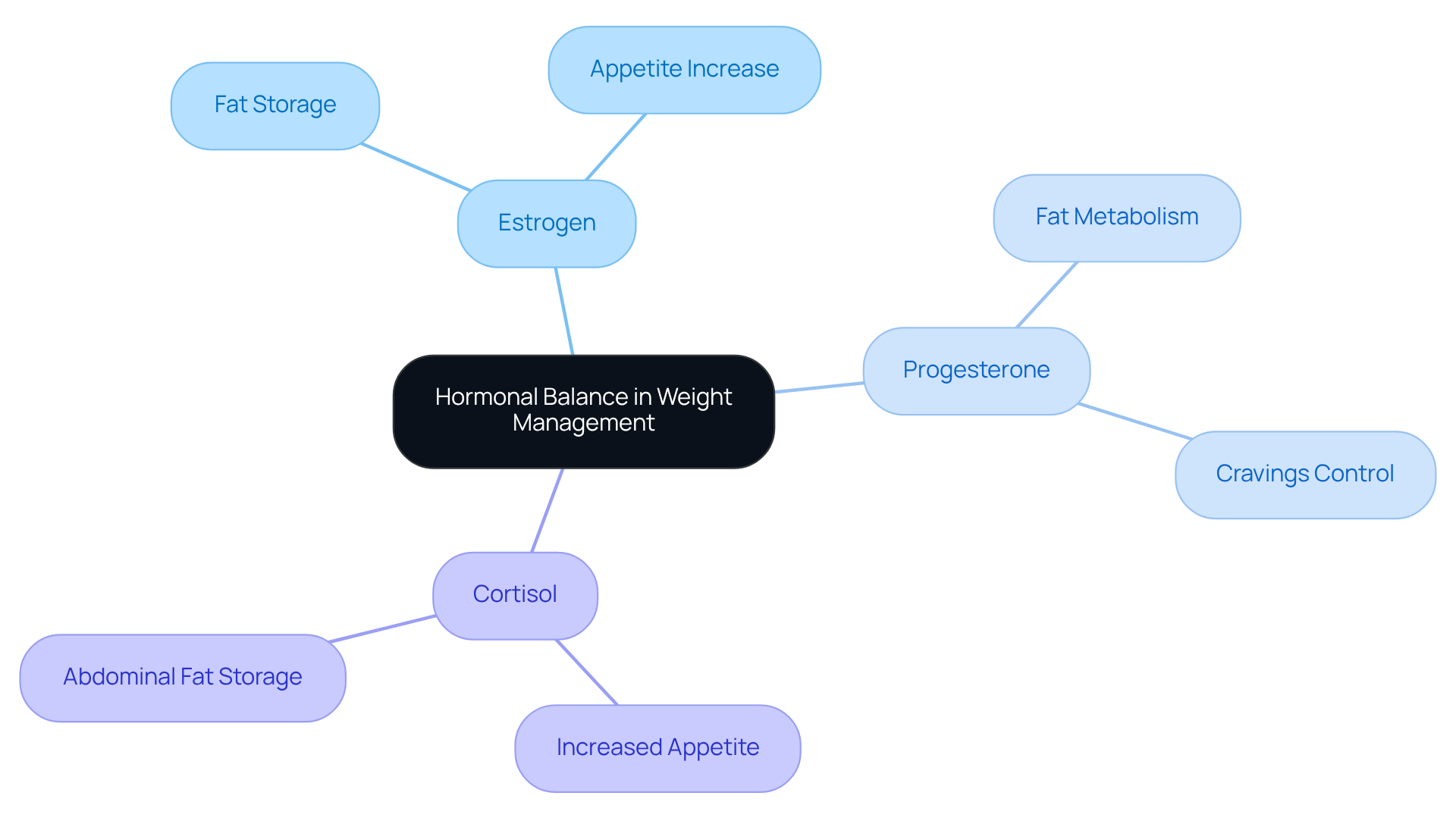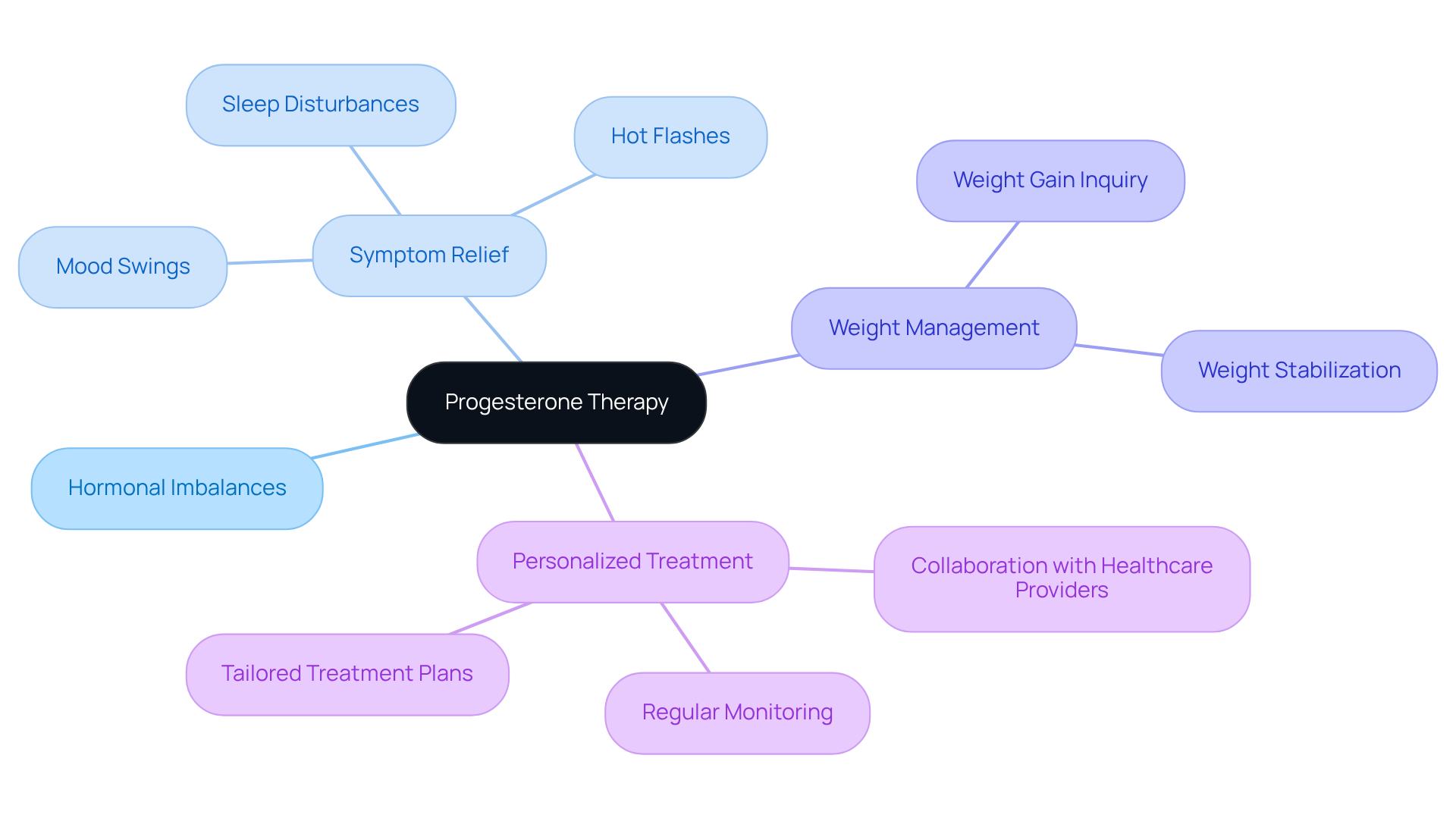Introduction
Navigating the relationship between hormones and weight can feel overwhelming, especially when it comes to progesterone. This vital hormone plays a key role in regulating the menstrual cycle and supporting pregnancy, yet many find themselves questioning its impact on body weight. For women, particularly those experiencing the challenges of menopause, the worry about whether progesterone leads to weight gain can be quite daunting.
As hormonal fluctuations become more pronounced, it’s essential to differentiate between genuine weight gain and other factors like water retention or changes in appetite. What insights can we uncover about progesterone’s true role in weight management? Together, we can explore how to effectively navigate these hormonal shifts and find clarity in this complex journey.
Define Progesterone: Role and Importance in the Body
Progesterone is a vital steroid hormone, primarily produced in the ovaries by the corpus luteum after ovulation. It plays a crucial role in regulating the menstrual cycle and supporting the early stages of pregnancy. By preparing the endometrium, or uterine lining, this hormone creates the perfect environment for a fertilized egg to implant, which is essential for embryo development. Additionally, it helps regulate other hormones, including estrogen, and influences various bodily functions such as mood, metabolism, and immune response.
For many middle-aged individuals, understanding the function of progesterone is especially important as they navigate hormonal shifts related to menopause. Did you know that around 80% of women experience menopausal symptoms? Thankfully, hormone replacement therapy (HRT), which includes female hormones, can provide relief. This therapy not only alleviates symptoms like hot flashes and mood swings but also plays a significant role in maintaining bone density, reducing the risk of fractures by 50-60%.
Endocrinologists emphasize the importance of progesterone in women’s health, noting its role in regulating the menstrual cycle and supporting pregnancy by ensuring uterine stability. As women age, a decrease in hormone levels can lead to various health issues, making it essential to monitor and manage these hormonal changes effectively. By understanding the multifaceted role of progesterone, middle-aged women can take proactive steps toward enhancing their overall health and well-being, especially in relation to whether does progesterone cause weight gain. Together, we can navigate these changes and prioritize our health.

Examine Progesterone’s Impact on Weight Gain
Understanding the connection between hormones and body mass can be quite complex, and it’s often misunderstood. Many individuals experience fluctuations in mass during hormone treatment, but it’s important to recognize that these changes don’t solely indicate fat gain. Factors like water retention, increased appetite, and metabolic adjustments can play significant roles.
Research shows that hormones can greatly influence appetite, leading to temporary increases in mass, especially during certain phases of the menstrual cycle or while undergoing hormone replacement therapy at Woodlands Wellness & Cosmetic Center. It’s crucial to differentiate between actual fat gain and other factors such as bloating or fluid retention. While this hormone may contribute to temporary changes, it raises the question: does progesterone cause weight gain?
For those managing hormonal health, especially during menopause when progesterone levels fluctuate, it is essential to understand whether progesterone causes weight gain. Did you know that over 80% of women experience menopause symptoms, which can last an average of eight years? This highlights just how prevalent hormonal changes are during this life stage.
Furthermore, the FDA’s recent decision to remove black box warnings from hormone treatments reflects evolving perspectives on hormone use. This shift may impact how we manage body mass and overall well-being. At Woodlands Wellness & Cosmetic Center, we’re committed to offering personalized hormone replacement therapy options, including alternatives like bioidentical hormone therapy and testosterone replacement. Together, we can promote optimal wellness and effectively manage body composition through careful analysis.
If you’re navigating these changes, remember that you’re not alone. We understand the challenges you face, and we’re here to support you on your wellness journey.

The Role of Hormonal Balance in Weight Management
Hormonal equilibrium is essential for effectively managing body mass, especially for women. We understand that navigating these changes can be challenging. Progesterone and estrogen play crucial roles, exerting opposing influences on appetite and fat storage. Estrogen encourages fat storage, particularly in areas like the hips and thighs, while progesterone aids in fat metabolism and helps curb cravings.
An imbalance between these hormones can lead to weight gain, prompting the question of whether progesterone causes weight gain, particularly during menopause when estrogen levels drop and progesterone levels fluctuate. Research shows that 45% of women using menopause hormone therapy alongside medications like tirzepatide experienced at least a 20% decrease in total body mass. In contrast, those using tirzepatide alone saw a reduction of only 14%. This highlights the importance of maintaining hormonal balance in your weight loss efforts.
Furthermore, elevated cortisol levels, often linked to stress, can exacerbate weight gain by increasing appetite and promoting fat storage, particularly in the abdominal area. Understanding these hormonal interactions is vital for anyone managing their weight during significant hormonal changes, especially regarding whether progesterone causes weight gain. As Dr. Christine Mullin notes, “Statistics indicate that 80 percent of females experience hormonal imbalance,” underscoring the need for awareness and proactive management of these factors. Together, we can navigate these challenges and work towards a healthier you.

Practical Implications of Progesterone Therapy
Progesterone treatment offers a compassionate solution for those facing hormonal imbalances, especially during menopause. Many individuals experience relief from common symptoms like mood swings, hot flashes, and sleep disturbances when hormone levels are restored. Moreover, hormone treatment can effectively address weight-related challenges, raising the question of whether progesterone causes weight gain that often accompanies these hormonal changes. Research shows that personalized hormone treatment strategies can lead to significant improvements in weight management, prompting the inquiry of whether progesterone causes weight gain, as many individuals report stabilization or even a decrease in weight after starting their treatment.
To truly maximize the benefits of hormone treatment, it’s crucial for women to collaborate closely with their healthcare providers. Tailoring treatment plans to meet individual needs involves regular monitoring of hormone levels and adjusting dosages as necessary. This personalized approach not only boosts the effectiveness of the therapy but also helps minimize potential side effects. As healthcare providers emphasize, understanding the multifaceted role of progesterone in weight management raises the question of whether progesterone does cause weight gain, empowering women to make informed decisions about their health and wellness. Together, we can navigate this transitional phase, ultimately leading to an improved quality of life.

Conclusion
Understanding the complexities of progesterone and its influence on weight management is essential for navigating hormonal health, especially for women experiencing menopause. This hormone plays a multifaceted role in the body, impacting not only reproductive functions but also metabolism and appetite regulation. Have you ever wondered how these hormonal changes affect your weight? By exploring the nuances of progesterone, it becomes clear that while it may contribute to temporary weight fluctuations, it does not directly cause weight gain in the same way that other factors, such as water retention and hormonal imbalances, can.
Key insights from the article highlight the importance of maintaining hormonal balance, particularly between progesterone and estrogen, to effectively manage body weight. Research indicates that personalized hormone replacement therapy can lead to significant improvements in weight management, especially for those experiencing menopausal symptoms. Furthermore, understanding the interplay between stress hormones like cortisol and progesterone can further clarify the dynamics of weight gain during this transitional phase.
Ultimately, empowering individuals to take proactive steps in managing their hormonal health is crucial. Together, we can collaborate with healthcare providers to tailor hormone treatment plans that not only alleviate symptoms but also support effective weight management. By fostering awareness of how progesterone interacts with other hormones and affects overall well-being, individuals can make informed decisions that enhance their quality of life and promote optimal health. Remember, you’re not alone in this journey; we’re here to support you every step of the way.
Frequently Asked Questions
What is progesterone and where is it produced?
Progesterone is a vital steroid hormone primarily produced in the ovaries by the corpus luteum after ovulation.
What role does progesterone play in the menstrual cycle?
Progesterone regulates the menstrual cycle and prepares the endometrium (uterine lining) for a fertilized egg to implant, which is essential for embryo development.
How does progesterone influence pregnancy?
Progesterone supports the early stages of pregnancy by creating a suitable environment in the uterus for embryo development.
What other hormones does progesterone help regulate?
Progesterone helps regulate other hormones, including estrogen.
What bodily functions does progesterone influence?
Progesterone influences various bodily functions such as mood, metabolism, and immune response.
Why is understanding progesterone important for middle-aged individuals?
Understanding progesterone is important for middle-aged individuals, especially women, as they navigate hormonal shifts related to menopause.
What percentage of women experience menopausal symptoms?
Around 80% of women experience menopausal symptoms.
How can hormone replacement therapy (HRT) help with menopausal symptoms?
HRT can alleviate symptoms like hot flashes and mood swings, and it plays a significant role in maintaining bone density, reducing the risk of fractures by 50-60%.
What is the importance of monitoring progesterone levels as women age?
Monitoring progesterone levels is essential as a decrease in hormone levels can lead to various health issues, making effective management of hormonal changes important for overall health.
Can progesterone cause weight gain?
The article mentions that understanding the role of progesterone can help address concerns regarding whether it causes weight gain, indicating that this is a consideration for many women.



